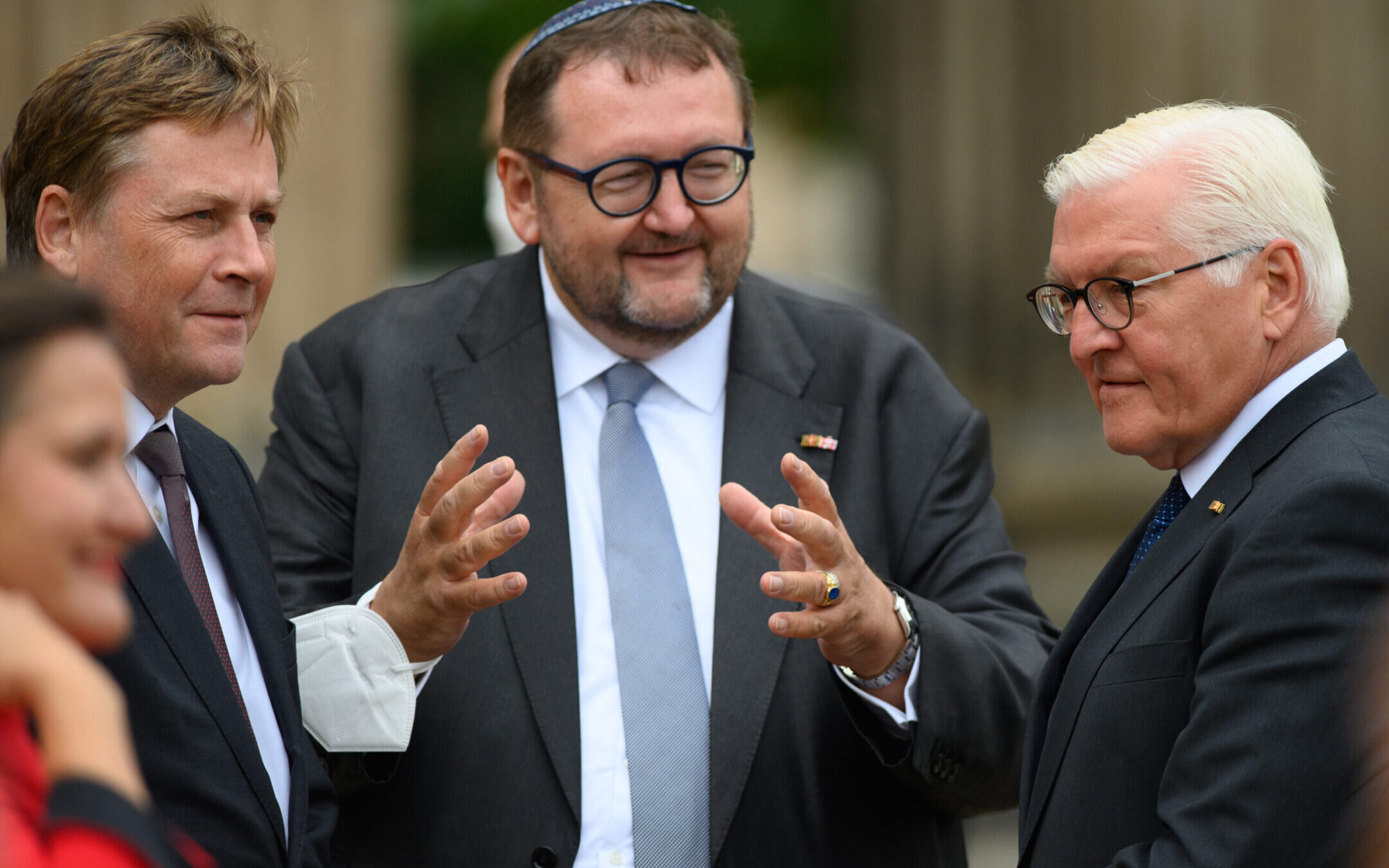German rabbi at center of ongoing scandal plagiarized his dissertation, newspaper finds

Rabbi Walter Homolka, then deputy director of the Institute for Jewish Theology, talk at the opening of the European Center for Jewish Scholarship at the University of Potsdam, Aug. 18, 2021. (Soeren Stache/picture alliance via Getty Images)
BERLIN (JTA) — The prominent German rabbi who was found to have abused his authority at the seminary he ran also appears to have plagiarized a portion of his 1992 dissertation.
That’s according to a new investigation into Rabbi Walter Homolka published this week in the Frankfurter Allgemeine Zeitung, a German newspaper.
More than 60 pages of Homolka’s 240-page dissertation, “From Essence to Existence. Leo Baeck and Religious Identity as a Problem of Continuity and Change in liberal Jewish and Protestant Theology,” consisted of verbatim translation of a German scholarly article – pages 43 to 106, according to the newspaper.
The doctoral dissertation at Kings College London did not include attribution or acknowledgment of the author, the Protestant German theologian Dorothee Schlenke. Only in 1994, when Homolka published his dissertation as a book in English and German, did he explicitly thank Schlenke, now a professor at the University of Education in Freiburg, the newspaper reported.
Kings College London removed public access to the dissertation the day that a reporter asked Homolka’s attorney about allegations of plagiarism, the newspaper reported.
Those allegations were among the long-simmering criticisms of Homolka that burst into public view after a different newspaper, Die Welt, published a blistering report last May about Homolka’s leadership at the Abraham Geiger College, the liberal seminary he founded in 1999, two years after he was ordained in a private ceremony.
Following the report’s revelations of a possible coverup and abuse of power by Homolka, both the University of Potsdam, which houses the seminary, and the Central Council of Jews in Germany initiated investigations. Homolka, who has vigorously contested all accusations, has since stepped back from virtually the Jewish institutions in which he played a formative role.
In its investigation report, released last October, the university said it had not found evidence of criminal actions, thus affirmed Homolka’s position as a professor there.
But the report did confirm abuse of power and noted that accusations of plagiarism, specifically his use of “an unpublished work by the Freiburg professor Dorothee Schlenke (‘Normativity and History,’ 1986),” required further investigation.
University spokesperson Silke Engel confirmed to the Jewish Telegraphic Agency that the university has asked Kings College London to clarify the status of Homolka’s 1992 dissertation. She added that, while the “abuse of power” report is final, allegations of “scientific misconduct are currently under investigation” and the results will be presented in a second report.
According to the new report, Homolka’s attorneys responded last June to their query about his dissertation, saying that “the unpublished work of Dorothee Schlenke was not the main source for the dissertation at Kings College London, nor does everything about the ‘essence debate’ [a theological thesis] go back to this work.” The lawyers added that “Schlenke’s research was helpful for our client’s dissertation, which is why it is mentioned in both the German and English book editions.”
On Jan. 26, responding to renewed questions, the lawyer confirmed that their client “stands by his previous statements in this regard.”
Neither Kings College nor Dorothee Schlenke have yet replied to queries from JTA.
The Central Council’s final report on allegations of abuse of power is expected to be released in the coming weeks.
This article originally appeared on JTA.org.

I hope you appreciated this article. Before you go, I’d like to ask you to please support the Forward’s award-winning journalism this Passover.
In this age of misinformation, our work is needed like never before. We report on the news that matters most to American Jews, driven by truth, not ideology.
At a time when newsrooms are closing or cutting back, the Forward has removed its paywall. That means for the first time in our 126-year history, Forward journalism is free to everyone, everywhere. With an ongoing war, rising antisemitism, and a flood of disinformation that may affect the upcoming election, we believe that free and open access to Jewish journalism is imperative.
Readers like you make it all possible. Right now, we’re in the middle of our Passover Pledge Drive and we need 500 people to step up and make a gift to sustain our trustworthy, independent journalism.
Make a gift of any size and become a Forward member today. You’ll support our mission to tell the American Jewish story fully and fairly.
— Rachel Fishman Feddersen, Publisher and CEO
Join our mission to tell the Jewish story fully and fairly.
Our Goal: 500 gifts during our Passover Pledge Drive!























